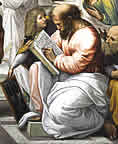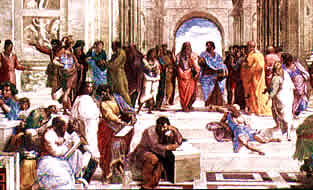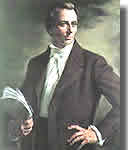| |||||||||||||||||||||||||||||||||
| Facts > Getting Started > Philosophy | |||
| |
Philosophy |
Sources |
| Ancient philosophy was religion |
For the ancients, philosophy was religion without revelation. |
|
Now, we imagine our religion is moral. Ancient civic religion wasn't, at least not the way we understand moral. People didn't bargain, "God save me from this illness, and I promise not to sin." Their bargaining was practical, "God, I'm giving you these nice cakes and incense, which be both know you like; now, you protect me from illness." Don't get fooled. Just because ancient civic religion didn't address morality (at least not the way we understand moral), don't you go thinking ancient people didn't care about morality, about right and wrong, good and evil and ultimate truth. They did. They just addressed the question with a different kind of institution. Where we use scripture and the revealed word of God to understand good and evil, they used philosophy. Who'd 'a thunk it? So let's talk about ancient philosophy. Remember that as we try to understand how ancient institutions translate into modern terms, it's useful to see philosophy as one of three kinds of ancient religion:
|
|||||||||||||||||
|
For the ancients, at least for big parts of the literate aristocracy, philosophy wasn't remote and abstract and theoretical, it was fundamental to your day to day understanding of the world, and to your personal idenity. People back then were Platonists, or Stoics, or Epicurians the same way people now are Baptists, or Catholics or atheists.
Philosophy—religion without revelation People who thought about meaning and divinity were called "philosophers." We use the same word today, but we mean something way different. It's a mistake for us to think of ancient philosophers as tweed jacket theorists. They were theologians. The best way to define the ancients' word "philosophy" to us—limited as we are to equating deity and revelation—is "religion without revelation." In a world without revealed religion, the ancient philosophers tried to figure out, What is God? Amazing. Ancient philosophers developed ethical and moral teachings that guided men and empires all around the Mediterranean for hundreds of years. |
||||||||||
You got that? Ancient religion wasn't like our religion. Civic religion, whose magic beings make it look to us like "religion", was mostly about controlling the world by bargaining with the god-beings—hardly a function of "religion" at all, as we see it. Philosophy was about ethics and morality, but it didn't have revelation—to us a key featrue of "religion"— but philosophy did not have revelation, so to us it doesn't look like religion at all. |
Good Books for this section
| From Religion
to Philosophy:
|
What you'll find:
First published in 1912. Still in print because it is very very good. Even if you're not a Pagan origins buff, this is a great book. Highly recommended.
|
| The Greeks
and the Irrational
|
What you'll find:
First published in 1951, still in print because it is very very good. Even if you're not a Pagan origins buff, this is a great general interest book. Highly recommended.
|
| Pagan Monotheism
in Late Antiquity
|
What you'll find:
|
| The
Cambridge Companion to Greek Philosophy
|
What you'll find:
|
| Greek Philosophy
|
What you'll find:
|



 Philosopy
φιλοσοφια
Philosopy
φιλοσοφια






